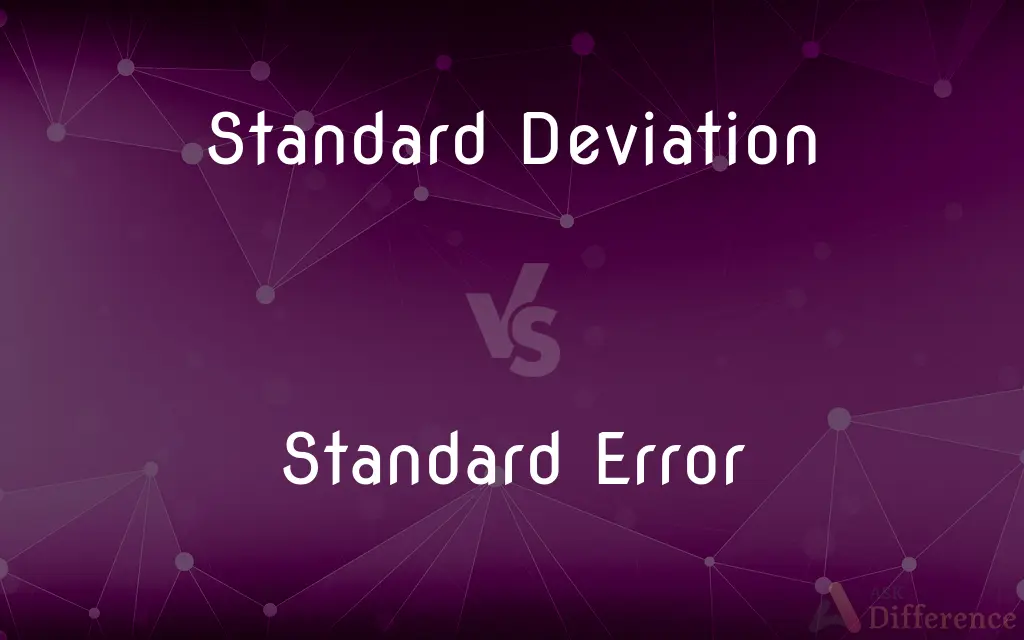Standard Deviation vs. Standard Error — What's the Difference?
By Tayyaba Rehman — Published on October 17, 2023
Standard Deviation measures data spread; Standard Error gauges accuracy of sample means.

Difference Between Standard Deviation and Standard Error
Table of Contents
ADVERTISEMENT
Key Differences
Standard Deviation is a statistic that captures the amount of variability or spread in a set of data. It quantifies how much individual data points deviate from the mean of that data. On the other hand, Standard Error pertains to statistics, particularly when sampling is in play. It assesses how much sample means will fluctuate from the actual population mean.
At the heart of Standard Deviation is the idea of distribution. It reveals how data is dispersed around the mean, giving insights into data consistency. The larger the Standard Deviation, the more dispersed the data. In contrast, Standard Error gives a window into the precision of a sample mean. A smaller Standard Error indicates the sample mean is a better estimator of the population mean.
When understanding data variability, Standard Deviation is the go-to metric. It's commonly employed in finance, science, and many other fields to understand risks, volatility, and data consistency. Meanwhile, Standard Error takes center stage in inferential statistics. When researchers or analysts wish to make predictions or inferences about a population based on sample data, they consult the Standard Error.
Comparing the two, Standard Deviation emphasizes data spread within a single data set, be it a sample or population. Standard Error, however, zeroes in on the reliability of sample means in estimating a population mean. It's a reflection of both the sample size and the standard deviation of that sample.
Comparison Chart
Definition
Measures data spread
Measures accuracy of sample means
ADVERTISEMENT
Focus
Individual data points
Sample means
Usage
Data variability
Inferential statistics
Relationship to Data
Dispersion around the mean
Fluctuation from the population mean
Affected By
Variability of individual data points
Size of the sample and its standard deviation
Compare with Definitions
Standard Deviation
Describes data consistency and spread.
The Standard Deviation of student grades revealed variation in performance.
Standard Error
Reflects sample size and sample standard deviation.
By increasing our sample size, we reduced the Standard Error.
Standard Deviation
Gauge of data dispersion.
Stock market returns often have a high Standard Deviation, signaling risk.
Standard Error
Quantifies how sample means deviate from the population mean.
A decreasing Standard Error signifies increasing accuracy in our predictions.
Standard Deviation
Quantifies data spread around the mean.
The Standard Deviation helped assess the consistency of the manufacturing process.
Standard Error
Gauge of the precision of a sample mean.
With the Standard Error in hand, we could infer about the entire population.
Standard Deviation
Indicates how much data points deviate from the average.
Due to the low Standard Deviation, we knew our measurements were precise.
Standard Error
Measure of sample mean reliability.
The low Standard Error implied our sample mean was a good estimator.
Standard Deviation
Measure of data variability.
A high Standard Deviation indicates a wide spread in test scores.
Standard Error
Indicates fluctuation of sample means.
A high Standard Error suggests our sample might not be representative.
Common Curiosities
What affects the value of Standard Error?
Standard Error is influenced by the sample size and the standard deviation of the sample.
What does the Standard Deviation measure?
Standard Deviation measures the spread or variability of data around its mean.
Is a high Standard Deviation always bad?
Not necessarily. It merely indicates data spread. Depending on context, high spread might be expected or acceptable.
Is the Standard Error a measure of data accuracy?
Not directly. It measures the accuracy of sample means, not individual data points.
Can a dataset have a high Standard Deviation but low Standard Error?
Yes, especially if the sample size is large.
How is Standard Error used in statistics?
Standard Error assesses the accuracy of sample means in estimating the population mean.
How are Standard Deviation and variance related?
Variance is the square of the Standard Deviation.
How is the Standard Deviation used in quality control?
It helps assess the consistency of a process.
Why is the Standard Deviation important in finance?
In finance, Standard Deviation gauges risk or volatility of investments.
How can one reduce the Standard Error?
Increasing the sample size often reduces the Standard Error.
Can Standard Error be used for individual data points?
No, it pertains to sample means, not individual data points.
Share Your Discovery

Previous Comparison
Isolation vs. Solitude
Next Comparison
Moxie vs. PluckAuthor Spotlight
Written by
Tayyaba RehmanTayyaba Rehman is a distinguished writer, currently serving as a primary contributor to askdifference.com. As a researcher in semantics and etymology, Tayyaba's passion for the complexity of languages and their distinctions has found a perfect home on the platform. Tayyaba delves into the intricacies of language, distinguishing between commonly confused words and phrases, thereby providing clarity for readers worldwide.
















































